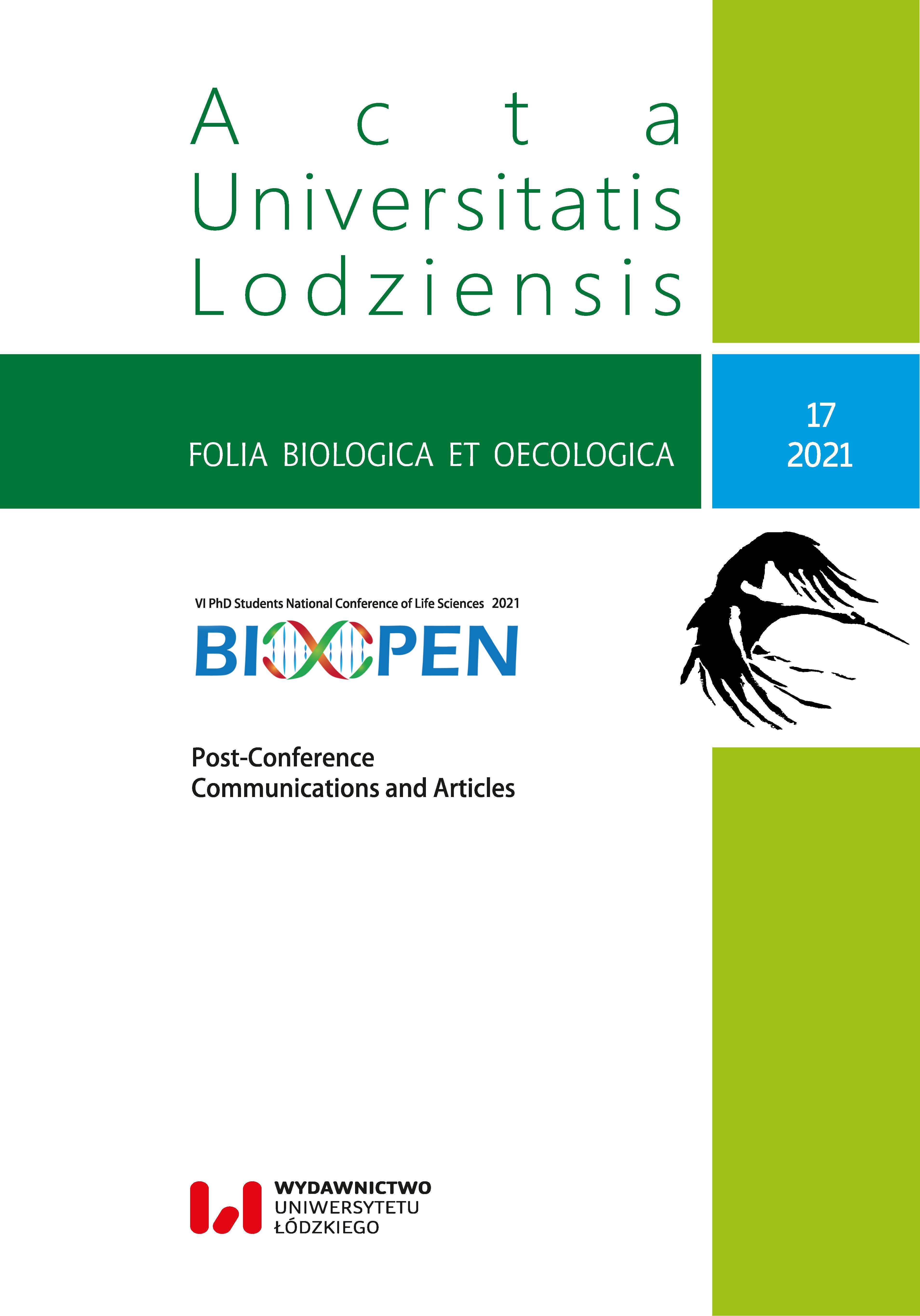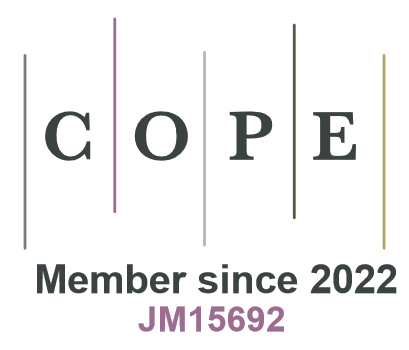Application of polymerase chain reaction-restriction fragment length polymorphism (RFLP-PCR) in the analysis of single nucleotide polymorphisms (SNPs)
DOI:
https://doi.org/10.18778/1730-2366.16.14Słowa kluczowe:
nucleotide polymorphisms, DNA analysis, polymerase chain reactionAbstrakt
Polymerase chain reaction-restriction fragment length polymorphism (RFLP-PCR) is a technique used to identify single nucleotide polymorphisms (SNPs) based on the recognition of restriction sites by restriction enzymes. RFLP-PCR is an easy-to-perform and inexpensive tool for initial analysis of SNPs potentially associated with some monogenic diseases, as well as in genotyping, genetic mapping, lineage screening, forensics and ancient DNA analysis. The RFLP-PCR method employs four steps: (1) isolation of genetic material and PCR; (2) restriction digestion of amplicons; (3) electrophoresis of digested fragments; and (4) visualisation. Despite its obsolescence and the presence of high-throughput DNA analysis techniques, it is still applied in the analysis of SNPs associated with disease entities and in the analysis of genetic variation of severe acute respiratory syndrome coronavirus 2 (SARS-CoV-2). RFLP-PCR is a low-cost and low-throughput research method allowing for the analysis of SNPs in the absence of specialised equipment, and it is useful when there is a limited budget.
Pobrania
Bibliografia
Alavian, S.E., Sharafi, H., Shirmast, P., Alavian, S. M., Behnava, B., Pouryasin, M., Keshvari, M., Pouryasin, A. 2018. A facile PCR-RFLP method for genotyping of ITPA rs1127354 and rs7270101 polymorphisms. Journal of Clinical Laboratory Analysis, 32: e22440.
Google Scholar
DOI: https://doi.org/10.1002/jcla.22440
Backfisch, W., Neuenschwander, S., Giger, U., Stranzinger, G., Pliška, V. 1994. Carrier detection of ovine hemophilia a using an RFLP marker, and mapping of the factor VIII gene on the ovine X-chromosome. Journal of Heredity, 85: 474–478.
Google Scholar
DOI: https://doi.org/10.1093/oxfordjournals.jhered.a111503
Berg Rasmussen, H. 2012. Restriction fragment length polymorphism analysis of PCR-ampli-restriction fragment length polymorphism afied fragments (PCR-RFLP) and gel electrophoresis – valuable tool for genotyping and genetic fingerprinting. In: Magdeldin, S. (ed.) Gel Electrophoresis – Principles and Basics, InTech, London.
Google Scholar
DOI: https://doi.org/10.5772/37724
Bhattacharyya, C., Das, C., Ghosh, A., Singh, A., Mukherjee, S., Majumder, P., Basu, A., Biswas, N. 2020. Global spread of SARS-CoV-2 subtype with spike protein mutation D614G is shaped by human genomic variations that regulate expression of TMPRSS2 and MX1 genes. bioRxiv, 2020.05.04.075911.
Google Scholar
DOI: https://doi.org/10.1101/2020.05.04.075911
Budowle, B., Chakraborty, R., Giusti, A.M., Eisenberg, A.J., Allen, R.C. 1991. Analysis of the VNTR locus D1S80 by the PCR followed by high-resolution PAGE. American Journal of Human Genetics, 48: 137–144.
Google Scholar
Catamo, E., Zupin, L., Segat, L., Celsi, F., Crovella, S. 2015. HLA-G and susceptibility to develop celiac disease. Human Immunology, 76: 36–41.
Google Scholar
DOI: https://doi.org/10.1016/j.humimm.2014.12.006
Chang, H.W., Cheng, Y.H., Chuang, L.Y., Yang, C.H. 2010. SNP-RFLPing 2: an updated and integrated PCR-RFLP tool for SNP genotyping. BMC Bioinformatics, 11: 173.
Google Scholar
DOI: https://doi.org/10.1186/1471-2105-11-173
Chang, H.W., Yang, C.H., Chang, P.L., Cheng, Y.H., Chuang, L.Y. 2006. SNP-RFLPing: restriction enzyme mining for SNPs in genomes. BMC Genomics, 7: 30.
Google Scholar
DOI: https://doi.org/10.1186/1471-2164-7-30
Endreffy, E., Várkonyi, Á., Kaiser, G.I., Raskó, I. 1992. Association of altered RFLP with coeliac disease among Hungarian families. Journal of Pediatric Gastroenterology and Nutrition, 14: 118–119.
Google Scholar
DOI: https://doi.org/10.1097/00005176-199201000-00026
Hagelberg, E., Hofreiter, M., Keyser, C. 2015. Ancient DNA: the first three decades. Philosophical Transaction of the Royal Society B: Biological Sciences, 370: 20130371.
Google Scholar
DOI: https://doi.org/10.1098/rstb.2013.0371
Harding, D. 2007. Impact of common genetic variation on neonatal disease and outcome. Archives of Disease in Childhood. Fetal and Neonatal Edition, 92: F408–F413.
Google Scholar
DOI: https://doi.org/10.1136/adc.2006.108670
Hashemi, S.A., Khoshi, A., Ghasemzadeh-Moghaddam, H., Ghafouri, M., Taghavi, M., Namdar-Ahmadabad, H., Azimian, A. 2020. Development of a PCR-RFLP method for detection of D614G mutation in SARS-CoV-2. Infection, Genetics and Evolution, 86: 104625.
Google Scholar
DOI: https://doi.org/10.1016/j.meegid.2020.104625
Herrmann, F.H., Wehnert, M., Wulff, K. 2008. RFLP analysis for diagnosis of haemophilia A in the German Democratic Republic. Clinical Genetics, 37: 12–17.
Google Scholar
DOI: https://doi.org/10.1111/j.1399-0004.1990.tb03384.x
Kozák, L., Kuhrová, V., Blažková, M., Fajkusová, L., Dvořáková, D., Romano, V., Pijáčková, A. 1995. Phenylketonuria mutations and their relation to RFLP haplotypes at the PAH locus in Czech PKU families. Human Genetics, 96: 472–476.
Google Scholar
DOI: https://doi.org/10.1007/BF00191809
Křepelová, A., Brdicka, R., Vorlová, Z. 1993. Factor VIII gene mutations and RFLP analysis in hemophilia A. Stem Cells, 11: 72–76.
Google Scholar
DOI: https://doi.org/10.1002/stem.5530110615
Laber, T.L., Giese, S.A., Iverson, J.T., Liberty, J.A. 1994. Validation studies on the forensic analysis of restriction fragment length polymorphism (RFLP) on LE agarose gels without ethidium bromide: effects of contaminants, sunlight, and the electrophoresis of varying quantities of deoxyribonucleic acid (DNA). Journal of Forensic Sciences, 39: 13649J.
Google Scholar
DOI: https://doi.org/10.1520/JFS13649J
Meijer, H., Jongbloed, R.J.E., Hekking, M., Spaapen, L.J.M., Geraedts, J.P.M. 1993. RFLP haplotyping and mutation analysis of the phenylalanine hydroxylase gene in Dutch phenylketonuria families. Human Genetics, 92: 588–592.
Google Scholar
DOI: https://doi.org/10.1007/BF00420944
Orlando, L., Allaby, R., Skoglund, P., Sarkissian, C. Der, Stockhammer, P.W., Ávila-Arcos, M.C., Fu, Q., Krause, J., Willerslev, E., Stone, A.C., Warinner, C. 2021. Ancient DNA analysis. Nature Reviews Methods Primers 1: 1–26.
Google Scholar
DOI: https://doi.org/10.1038/s43586-020-00011-0
Pingoud, A., Jeltsch, A. 2001. Structure and function of type II restriction endonucleases. Nucleic Acids Research, 29: 3705–3727.
Google Scholar
DOI: https://doi.org/10.1093/nar/29.18.3705
Plante, J.A., Liu, Y., Liu, J., Xia, H., Johnson, B.A., Lokugamage, K.G., Zhang, X., Muruato, A.E., Zou, J., Fontes-Garfias, C.R., Mirchandani, D., Scharton, D., Bilello, J.P., Ku, Z., An, Z., Kalveram, B., Freiberg, A.N., Menachery, V.D., Xie, X., Plante, K.S., Weaver, S.C., Shi, P.Y. 2020. Spike mutation D614G alters SARS-CoV-2 fitness. Nature, 592: 116–121.
Google Scholar
DOI: https://doi.org/10.1038/s41586-020-2895-3
Pramoonjago, P., Harahap, A., Taufani, R.A., Setianingsih, I., Marzuki, S. 1999. Rapid screening for the most common β thalassaemia mutations in south east Asia by PCR based restriction fragment length polymorphism analysis (PCR-RFLP). Journal of Medical Genetics, 36: 937–938.
Google Scholar
Saiki, R.K., Scharf, S., Faloona, F., Mullis, K.B., Horn, G.T., Erlich, H.A., Arnheim, N. 1985. Enzymatic amplification of β-globin genomic sequences and restriction site analysis for diagnosis of sickle cell anemia. Science, 230: 1350–1354.
Google Scholar
DOI: https://doi.org/10.1126/science.2999980
Stankovic, M., Rakicevic, L., Mikovic, D., Jankovic, G., Nikolic, A. 2005. Indirect diagnosis of haemophilia B by multiplex PCR/RFLP. Clinical & Laboratory Haematoology, 27: 145–146.
Google Scholar
DOI: https://doi.org/10.1111/j.1365-2257.2005.00671.x
Tasleem Raza, S., Husain, N., Kumar, A. 2009. Screening for hemophilia A carriers: Uutility of PCR-RFLP-based polymorphism analysis. Clinical and Applied Thrombosis, 15: 78–83.
Google Scholar
DOI: https://doi.org/10.1177/1076029607305105
Zhou, B., Thi Nhu Thao, T., Hoffmann, D., Taddeo, A., Ebert, N., Labroussaa, F., Pohlmann, A., King, J., Steiner, S., Kelly, J.N., Portmann, J., Halwe, N.J., Ulrich, L., Trüeb, B.S., Fan, X., Hoffmann, B., Wang, L., Thomann, L., Lin, X., Stalder, H., Pozzi, B., Brot, S. de, Jiang, N., Cui, D., Hossain, J., Wilson, M., Keller, M., Stark, T.J., Barnes, J.R., Dijkman, R., Jores, J., Benarafa, C., Wentworth, D.E., Thiel, V., Beer, M. 2021. SARS-CoV-2 spike D614G change enhances replication and transmission. Nature, 592: 122–127.
Google Scholar
DOI: https://doi.org/10.1038/s41586-021-03361-1
Pobrania
Opublikowane
Jak cytować
Numer
Dział
Licencja

Utwór dostępny jest na licencji Creative Commons Uznanie autorstwa – Użycie niekomercyjne – Bez utworów zależnych 4.0 Międzynarodowe.









